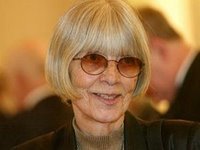Jaroslava Moserová
 Jaroslava Moserová died on Friday morning after a long fight with cancer. Moserová was known as a senator, translator, writer, and doctor. She was 76. Though not as well known as ex-President Havel, Moserová was one of those quiet fighters with strongly held principles and, I think, was one of the most admirable and admired figures on the recent Czech political scene.
Jaroslava Moserová died on Friday morning after a long fight with cancer. Moserová was known as a senator, translator, writer, and doctor. She was 76. Though not as well known as ex-President Havel, Moserová was one of those quiet fighters with strongly held principles and, I think, was one of the most admirable and admired figures on the recent Czech political scene.I saw Moserová during a visit to (of all places) Spillville, Iowa, in 2003. She was a person full of energy, life, and curiosity. During a tour of the Saint Wenceslas Church she insisted on being shown the organ loft and played the opening of Bach's Tocatta and Fugue in D Minor. The town is famous for hosting composer Antonín Dvořák who stayed there during his trip to the U.S., and that organ was possibly the same that he played most mornings during his summer in Spillville.
I also remember translating a portion of her memoirs for a Czech exam. In the section we translated, at least as I vaguely remember it, she described an unknown boy who turned up at her family's apartment. The boy turned out to be Miloš Forman, a Czech film director still active in the United States. (Forman directed the film version of Hair and many other better-known films, although I like his early Czech New Wave films from the 1960s like Lásky jedné plavovlásky ["Loves of a Blonde"].)
In her career as a burn specialist, Moserová was the first doctor to treat Jan Palach after his self-immolation act on Wenceslas Square (Prague) in January 1969. She said, "I heard the news when he was actually brought in. And as you know I don't like to talk about it. He was fully conscious and he could talk. The first day he could still talk without great difficulty. And he kept repeating 'tell everyone why I did it' and we did try to tell everyone. And we kept telling him, that what he did was not in vain. It was highly oppressive, the whole situation. The fact that people that were not only giving up but also giving in, and the slow demoralisation was setting in. And that's why he did it - he didn't do it because of the occupation, but because of the demoralisation that was setting in. He wanted to shake the conscience of the nation. And he did - not only in our country, in many others as well."
Rob Cameron of Czech Radio recalls meeting her: "Jaroslava Moserova made a deep impression on all who met her, not least inexperienced radio reporters taking their first tentative steps into journalism. When I first met her she was standing as an outsider in the 2003 presidential campaign - a female David standing up to two political Goliaths. She beat the first - Milos Zeman - only to be eradicated by the second, Vaclav Klaus. But while she was diminutive in stature she was, for many people, a towering moral authority."
During the 1990s she served as the Czech ambassador to Australia and New Zealand. She also served in various functions with the Czech and Executive UNESCO boards. Upon receiving an order of merit from French President Jacques Chirac in 2004, she wrote (my translation): "My credo has always been to do that which you have to do, to do it as best you can, and not to lie, at least not to oneself. Of course I have lied about a few things, but only for the loftiest of reasons in this or that. To this day I can only remember two times when I lied consciously in answer to a direct question, and I will never be able to forget them. During the times of darkness I did not display heroism, but I didn't sell out either."
Further:
Czech Radio tribute by Rob Cameron
Czech Radio mention
Moserová's Web site
Lidové noviny obituary (in Czech)
Photo by Tomáš Krist (Lidové noviny), 2003.
Tagged: Czech, people, culture, Moserova
 A graduate student in music and anthropology writing a dissertation about music in Moravia, the eastern third of the Czech Republic. At some point, the Czech Republic's "second city" (that would be Brno) captured my attention, and I've since been blogging about events, arts, music, and other stuff—basically whatever interests me in and around the cityscape. I'm not living in Brno now, but I keep up with the cultural pulse from afar as best I can.
A graduate student in music and anthropology writing a dissertation about music in Moravia, the eastern third of the Czech Republic. At some point, the Czech Republic's "second city" (that would be Brno) captured my attention, and I've since been blogging about events, arts, music, and other stuff—basically whatever interests me in and around the cityscape. I'm not living in Brno now, but I keep up with the cultural pulse from afar as best I can.


Comments:
» Post a Comment